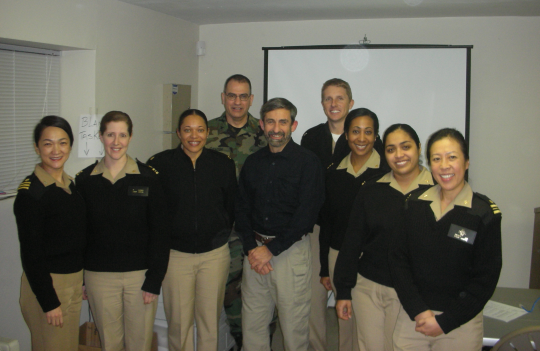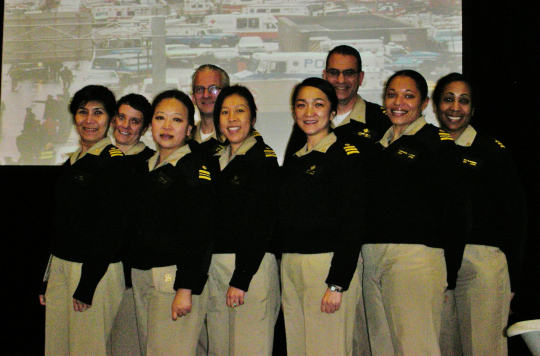Volume 8, No. 3 May 21, 2012

In Brief...
Prior Issues...
- 2008
- 2007
- 2006
- 2005
- 2014
- 2013
- 2012
- 2011
- 2010
- 2009
PDF Archives
- 2000
- 1999
- 1998
- CC Bulletin Supplements
- 2005
- 2004
- 2003
- 2002
- 2001
RIST-NCR Responds to Emergency and Public Health Needs
in the National Capital Region
in the National Capital Region
LCDR Karen Chaves, CAPT Nate Tatum, CDR Sally Hu
The Regional Incident Support Team – National Capital Region (RIST-NCR) has proven to be integral to the overall success of the region’s Emergency Support Function 8. The team is comprised of PHS Officers who live and work in the National Capital Region (NCR). RIST-NCR is one of eleven RIST teams. Each RIST team is a short-term response asset available to Regional Emergency Coordinators and Regional Health Administrators within the region. Moreover, RISTs are Tier 1 teams that can deploy within 12 hours of activation. These deployments are typically very short lasting between 1 and 3 days.
The primary areas of RIST activities and reporting include:
RIST-NCR has successfully supported the Emergency Management Group (EMG) in the U.S. Department of Health and Human Services (HHS) Secretary’s Operation Center (SOC) and more noteably the NCR Incident Response Coordination Team (IRCT) during 15 public health emergencies and nationally significant events since 2009. During these deployments, team members took on various leadership roles within the incident command structure such as administration/finance, logistics, planning, and operation sections, along with providing liaison officers to various partner agencies.
In 2011, RIST-NCR has also:
RIST-NCR provides PHS officers excellent opportunities to take on leadership roles and make significant contributions to HHS emergency response missions by rapidly responding to public health needs in National Capital Region.
“It’s a very rewarding experience being part of RIST-NCR. We have the opportunity to deploy and work together several times a year, but we’re still able to maintain a stable work schedule and we don’t have to worry about being away from our families for a long period of time,” says CDR Sally Hu.
“Even though we work in an environment where we’ve got very high level exposure to the EMG and the REC (Regional Emergency Coordinator), it’s a very supportive environment, and we take training and hands-on experience very seriously,” says CAPT Nate Tatum.
If you are in the Washington Metropolitan Area and are interested in joining RIST-NCR team; please contact CDR Sally Hu at hus@mail.nih.gov . For more information about Regional Incident Support Teams please see: (RIST-NCR: http://ccrf.hhs.gov/ccrf/FactSheets/RIST_Fact_Sheet_FINAL.pdf).


The Regional Incident Support Team – National Capital Region (RIST-NCR) has proven to be integral to the overall success of the region’s Emergency Support Function 8. The team is comprised of PHS Officers who live and work in the National Capital Region (NCR). RIST-NCR is one of eleven RIST teams. Each RIST team is a short-term response asset available to Regional Emergency Coordinators and Regional Health Administrators within the region. Moreover, RISTs are Tier 1 teams that can deploy within 12 hours of activation. These deployments are typically very short lasting between 1 and 3 days.
The primary areas of RIST activities and reporting include:
- Support and direction for incoming response assets;
- Liaison with State, Tribal and local officials;
- On-site incident management; and
- Response asset health and safety.
RIST-NCR has successfully supported the Emergency Management Group (EMG) in the U.S. Department of Health and Human Services (HHS) Secretary’s Operation Center (SOC) and more noteably the NCR Incident Response Coordination Team (IRCT) during 15 public health emergencies and nationally significant events since 2009. During these deployments, team members took on various leadership roles within the incident command structure such as administration/finance, logistics, planning, and operation sections, along with providing liaison officers to various partner agencies.
In 2011, RIST-NCR has also:
- Completed a Performance and Needs Analysis to assess training needs;
- Created a Dashboard tool to track each team member’s availability, deployment and training history;
- Created a Continuity of Operations Plan phone tree; and
- Developed training plans for each team member based on their chosen deployment role.
RIST-NCR provides PHS officers excellent opportunities to take on leadership roles and make significant contributions to HHS emergency response missions by rapidly responding to public health needs in National Capital Region.
“It’s a very rewarding experience being part of RIST-NCR. We have the opportunity to deploy and work together several times a year, but we’re still able to maintain a stable work schedule and we don’t have to worry about being away from our families for a long period of time,” says CDR Sally Hu.
“Even though we work in an environment where we’ve got very high level exposure to the EMG and the REC (Regional Emergency Coordinator), it’s a very supportive environment, and we take training and hands-on experience very seriously,” says CAPT Nate Tatum.
If you are in the Washington Metropolitan Area and are interested in joining RIST-NCR team; please contact CDR Sally Hu at hus@mail.nih.gov . For more information about Regional Incident Support Teams please see: (RIST-NCR: http://ccrf.hhs.gov/ccrf/FactSheets/RIST_Fact_Sheet_FINAL.pdf).

From left to right: CDR Sally Hu, LCDR Tara Gooen, LCDR Charlene Sydnor, CAPT Nate Tatum, Mr. Glenn R. Blanchette (ESF #8 Regional Emergency Coordinator-National Capitol Region), CDR Ted Palat, CDR Chekesha Clingman, LTJG Darielis Williams, and LCDR Karen Chaves supported the 2012 State of the Union Address

From left to right: CDR Chauha Pham, LCDR Lorelei Piantedosi, LCDR Minglei Cui, LCDR James Kenney, LCDR Karen Chaves, CDR Sally Hu, CAPT Nate Tatum, LCDR Charlene Sydnor, and CDR Chekesha Clingman attended ICS300/400 class at Arlington County Fire Department in February 2012



